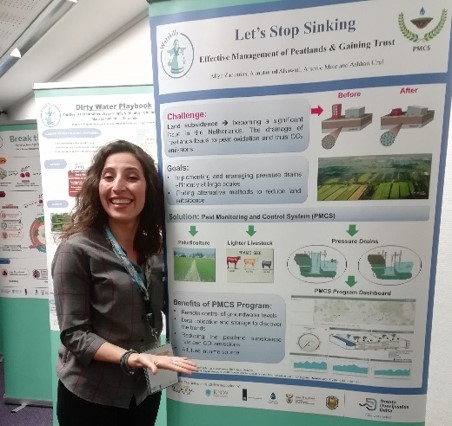Aslihan Ural

Where do you call home? Can you describe it?
I was born and grew up in Istanbul. My family and most friends are there. This is the city I call home and miss, especially watching the Bosporus. Istanbul is a huge metropolitan city with over 20 million population and with a few green parks. However, amazing coastlines, bridges, well protected historical sites and artifacts, and variety of food make the city unique. It also has variety of cultures due to the immigration for many years. This makes the city cosmopolitan but disturbingly unequal. Although it started to experience extreme weather conditions due to the climate change, the weather is still nice in every season.
What are some of your personal interests and hobbies?
I love swimming in the sea, but experienced swimming in river and lake in the Netherlands. I like music, listening various world music types -especially Celtic-, sweets/desserts, sightseeing -especially historical-, writing -keeping diaries-, experimenting in the kitchen.
What is your biggest personal achievement so far?
Having a number of great friends from my childhood, still keeping a good contact with them despite the long distances. My enthusiasm and efforts on voluntary jobs (during my bachelor) and helping people. Both gives me inspiration, motivation and joy in my life.
What is the title of your PhD project? Can you explain it to a non-academic?
The title of my PhD project is “Modelling the effects of bio-based fertilizers use on air and surface water pollution at basin and European scales”.
Agricultural activities led to considerable nutrient losses to the environment causing pollution. Upcycling organic waste is one of the promising options to produce renewable bio-based fertilizers (e.g., manure). However, the environmental impacts thereof are not completely known. My research aims to assess the effects of bio-based fertilizer use on water and air pollution at sub-basin and European scales. To this end, I link an agricultural and a water quality model to quantify the nutrient emissions to air and waters. This will help us to estimate the effects of replacing bio-based fertilizers with synthetic fertilizers in the future and to assess the mitigation options to reduce environmental impacts of increased bio-based fertilizer use.
What drives your interest in bio-based fertilisers?
Although I am an environmental engineer, agriculture has always been my interest. This ITN project and topic of my research motivated me to apply this PhD position by quitting my job in the Ministry of Agricultural and Forestry in Turkey. Recently the scientists focus more on sustainable and efficient agriculture. However, organic waste sources (e.g., animal manure, human waste) are still not managed sufficiently in agricultural production. We need to better understand recycling/upcycling of nutrients to design better bio-based fertilizers, maximize their utility and agronomic efficiency, while minimizing their environmental impacts.
Describe your experience with the FertiCycle ITN so far?
It is amazing. Even though communicating mostly online so far, both management and supervisory boards, and ESRs are very friendly, motivated and helpful. This has increased my motivation and cooperation. Also, having the senior researchers’ expertise on the field and training courses have contributed our knowledge.
What would you say are the benefits of the Marie Sklodowska-Curie Doctoral Fellowship?
It is a well-organized, enabling good research projects and reasonable funding. The fellowship also provides a large international and multidisciplinary network including both scientific institutions and organizations (e.g., private sector). This improves collaboration between scientists and other stakeholders while providing future career opportunities
How has the experience traveling abroad for this program been for you?
I already lived abroad for my master, but living and working in the Netherlands was my dream that came true. Such a friendly, helpful and flexible working environment, always constructive and supportive supervisors and doing research in one of the best universities in the world is a quite remarkable experience. Also amazing nature sites for trekking and camping, and cycling as a part of life are my favorites. I cannot say I’m fun of Dutch kitchen, but I like oliebollen (oil balls) and poffertjes.
